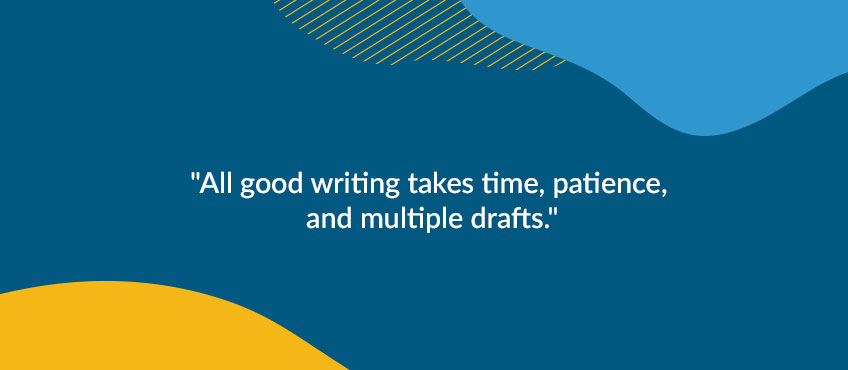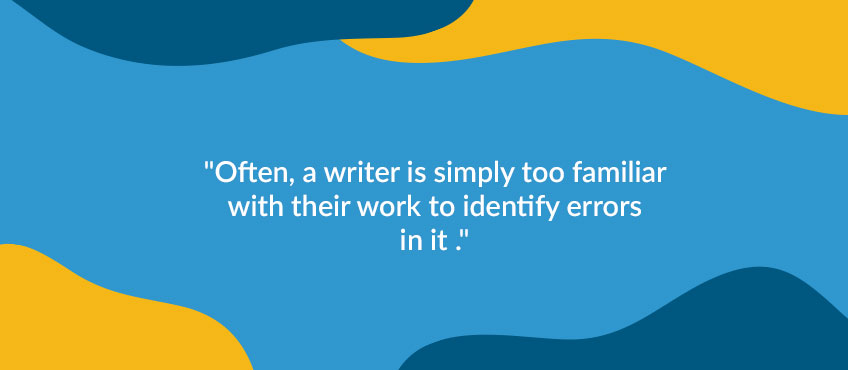Academic writing is a mysterious topic. Only a select portion of the population engages in it, and those that do must navigate a labyrinth of specialized language and citations.
That being said, an even smaller segment regularly proofreads and edits academic writing, and it's therefore no small wonder that there are many misconceptions about the subject.
At Scribendi, we strive to provide the best proofreading and editing services to our clients while also providing them with the knowledge they need to make informed decisions about their orders. Below, we'll discuss and dispel five common misconceptions about academic proofreading and editing. Read on to learn more.
#1 Editors and Proofreaders Might Rewrite Your Material
The first common misconception we'll address is the fear that editors and proofreaders might rewrite your material. While this may be a valid concern for some writers, the role of professional editing and proofreading is certainly not to change the meaning of your text.
Rather, these professionals revise various elements of your work, such as its structure, style, grammar, and punctuation, to help improve your overall text and convey your intended message. Professional editors and proofreaders, such as those at Scribendi, take this responsibility seriously. If more intensive changes are required, editors and proofreaders will also leave suggestions and queries throughout the document. It is then your choice, as the writer, to decide whether you agree or disagree with those suggestions.
#2 You Only Need One Editing Pass
This misconception is often made by those who believe that their writing is 100% error free—which is almost never the case, no matter how skilled a writer they may be. Even the most celebrated of writers have had their work undergo multiple revisions before the final publication. Revisions help an author clarify their meaning, strengthen their arguments, and deepen the overall impact of their work. There's a reason that nearly all major publishing houses require multiple editing passes.

To ensure high quality in your text, have it reviewed by several editors and, eventually, proofreaders (see the distinction in #3). This process allows you to gain different perspectives as various editors and proofreaders may catch mistakes that others fail to notice. All good writing takes time, patience, and multiple drafts.
#3 Editing and Proofreading Are the Same
While these terms seem similar, they aren't quite the same, and the variances between them contribute to many common misconceptions about academic proofreading and editing. To understand the difference between these two terms, remember that editing involves revising structure and flow, maintaining an author's voice, and clarifying content. This process can take a lot of time as several revisions are typically required before a piece of writing can be deemed "ready."
Proofreading, however, is the final stage of revision prior to a document's completion: it's when any remaining surface issues, such as grammatical errors, typos, and punctuation mishaps, are addressed. It is a crucial step in the overall editing process as proofreaders catch a variety of irregularities that word processing applications (e.g., Microsoft Word) tend to miss.For example, regional variants of English (e.g., American, Australian, British) have different spellings for some words, and these variances can be easily overlooked by word processing applications. If a proofreader spots substantial issues in the text—the presence of which can mean the difference between being accepted or rejected by a journal—then they will likely suggest another round of editing.
#4 Self-publishing? You Don't Need an Editor
While self-publishing may yield higher returns compared to traditional publishing, it does not mean that you should edit your own work. Self-publishing allows for a great deal of creative freedom: you can write about whatever you want, however you want.

Nevertheless, a self-edited work may be published full of grammatical errors. Often, a writer is simply too familiar with their work to identify errors in it. A writer already knows how their work should look, sound, and connect to other ideas, and as a result, they overlook mistakes. Writing does not rely on the same skillset that editing does, and writers should always consider asking an editor or proofreader with a fresh perspective to review their work.
#5 All Editors Can Edit Academic Writing
Some believe that, regardless of the situation, writing and editing are universally transferable skills. However, this could not be further from the truth. For example, many academic fields use specialized terminology that often only makes sense in specific contexts. An editor who worked on the latest New York Times bestseller is skilled at editing fiction, but those skills do not necessarily transfer to editing the highly specialized language and often rigid structure of academic writing.
Editors with specialized experience in academic editing, such as Scribendi's academic editors, will be better equipped to help you effectively lay out your arguments and research for an audience of experts.
Conclusion
We hope that dispelling these five common misconceptions about academic proofreading and editing will help you understand the proofreading and editing process and prepare you to make informed decisions about your order. We welcome you to share our advice with others so that they too can dispel these misconceptions and be empowered to make smart decisions about their academic orders.
As a final recommendation, remember that no matter how confident you might be in your writing, it's always helpful to submit your document to a professional editor or proofreader. They can help you catch surface errors or gaps in logic that you might have otherwise missed.
Image source: andrijana bozic/unsplash.com
Strengthen Your Writing with Professional Proofreading and Editing
Hire an Expert Academic Editor, or Get a Free Sample
About the Author
Ryan is an in-house editor at Scribendi, and although he has yet to publish any of his work, he hasn’t held back from filling-up folder after folder with short stories and random gibberish. After hours, he enjoys critiquing film with family and friends, scribbling in his art book, and staring at the tantalizing blank page of a word document.










